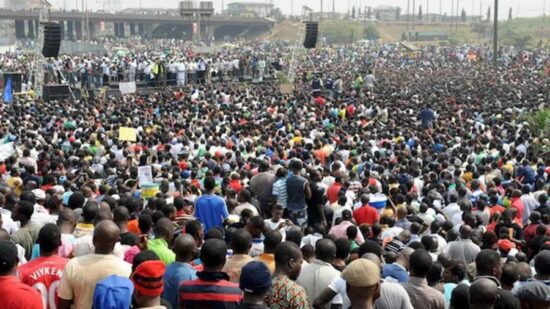Nigeria’s population was 140,431,790 according to the 2006 census conducted by the National Population Commission (NPC). By the National Bureau of Statistics estimates, the country’s population had grown to 193,392,517.
Takeaway:
The population of the North-West is 723,027 more than the population of North-East and South-East zones combined.
The population of the North-West puts the zone ahead of other geopolitical zones in representation at the National Assembly. It has the highest number of lawmakers in The Senate with 21 senators.
At the House of Representatives, North-West is represented by 86 lawmakers, making the highest.
North-west also has the highest number of Local Government Areas with 186.
In this article, we will be using the 2016 estimates to determine which of the six geopolitical zones is the largest by population
North-West
The population of the North-West was estimated at 48,942,307 in 2016, making the zone the most populated in Nigeria.
- Kano: 13,076,892
- Kaduna: 8,252,366
- Katsina: 7,831,319
- Jigawa: 5,828,163
- Sokoto: 4,998,090
- Zamfara: 4,515,427
- Kebbi: 4,440,050
Kano State is the most populated while Kebbi has the lowest population in the North-West. Also, the North-West zone has the highest number of Local Government Areas in Nigeria.
South-West
Dominated by the Yoruba people, the South-West has the second largest population according to the 2016 estimates.
- Lagos: 12,550,598
- Oyo: 7,840,864
- Ogun: 5,217,716
- Osun: 4,705,589
- Ondo: 4,671,695
- Ekiti: 3,270,798
North-Central
According to the 2016 NBS estimates, the North-Central geopolitical zone had 29,252,408 people.
In the zone, Benue had 5,741,815, Kogi had 4,473,490, Kwara’s population was 3,192,893, Nasarawa recorded 2,523,395 people, Niger’s population was 5,556,247, Plateau had 4,200,442 while the Federal Capital Territory (FCT) had 3,564,126.
South-South
The oil-rich zone also known as the Niger Delta zone is the 4th on the table according to the 2016 estimates, the South-South had 28,829,288.
- Rivers: 7,303,924
- Delta: 5,663,362
- Akwa Ibom: 5,482,177
- Edo: 4,235,595
- Cross River: 3,866,269
- Bayelsa: 2,277,961
North-East
North-east is the worst hit by the activities of terrorist organisations like Boko Haram and ISWAP. The North-East is the largest by land size in Nigeria
Despite the state of insecurity in the zone, NBS estimates put the population of the most troubled zone at 26,263,866
- Bauchi: 6,537,314
- Borno: 5,860,183
- Adamawa : 4,248,436
- Yobe: 3,294,137
- Gombe: 3,256,962
- Taraba: 3,066,834
South-East
The population of the South-East zone in the 2016 estimates was 21,955,414, making it the smallest zone in Nigeria. It also has the lowest number of states, while others have at least six, the zone has just five.
- Anambra: 5,527,809
- Imo: 5,408,756
- Enugu: 4,411,119
- Abia: 3,727,347
- Ebonyi: 2,880,383
Observation on North-East Increasing Population:
Since Boko Haram attacks and killings began in 2009, not less than 35,000 people have been killed, according to the Global Centre For The Responsibility To Protect.
Nigeria has relied on the estimates of NBS since the last census was conducted in 2006. In the estimates, it’s discovered that the population of Borno, the epicentre of the insurgency, continues to rise even as there are reports that thousands of residents fled their ancestral homes to neighbouring states and countries.
For instance, Borno’s population was 4,171,104 in 2006. By 2010, the population was estimated to have risen to 4,778,758.
By 2015 when attacks had reached its crescendo, the National Population Commission and National Bureau of Statistics estimated that the population of the Borno had again risen to 5,664,285 even when many towns and villages in the state had been deserted.
What’s responsible for Nigeria’s growing population?
What was the estimated population of Nigeria in 2014?
Is Nigeria’s population increasing or decreasing?
By the available data from 2006 till 2016, 52,960,727 people had been added. Another estimate by statista.com says Nigeria’s population is expected to reach 233.3 million people.
Is Nigeria overpopulated?
And by 2100, it’s estimated that Nigeria will overtake China which currently has 1.4 billion people.
While most countries are worried about population decline, the world bank is worried about population explosion in Nigeria.
What’s the most populated state in North-West Zone?
Recap:
| Zones | Population By Zone | Position |
| North-West | 48,942,307 | 1 |
| South-West | 38,257,260 | 2 |
| North-Central | 29,252408 | 3 |
| South-South | 28,829,288 | 4 |
| North-East | 26,263,866 | 5 |
| South-East | 21,955,414 | 6 |
Sources:
- Featured Image by Nairametrics
- Global Centre For The Responsibility To Protect (March 1, 2022). “Nigeria: Population At Risk”. Globalr2p.org. Retrieved March 8, 2022
- Population Forecast. “National Population Estimates”. Nigerianstat.gov.ng. Retrieved March 9, 2023
- Ojo Maduekwe (October 9, 2017). “These figures explain why the north-west is anti restructuring”. TheCable.ng. Retrieved March 10, 2022

